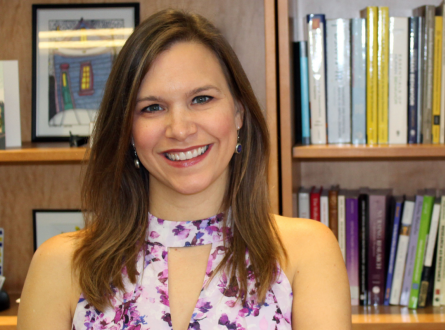Catherine McKinley, PhD, LMSW
Associate Professor

Education & Affiliations
Areas of Expertise
Biography
Dr. McKinley was drawn to health disparities research related to Indigenous Peoples (e.g. Native American, American Indian, Alaska Native, and/or Native Hawaiian in the U.S.) due to many of the distinct strengths demonstrated by these peoples as well as the high disparities related to violence, mental, and physical health. Her work began with an exploration on how a non-Indigenous person, such as herself could work as an ally to contribute toward culturally sensitive, beneficial, and ethical research with these peoples. After conducting research on “how to conduct culturally sensitive research” she began working with tribes of the Southeast to address disparities in violence, mental health, substance abuse and health. Her work now extends cross-nationally. Given there has been a lack of culturally relevant frameworks to explain disparities, she has worked in collaboration with tribes to develop the ecological “Framework of Historical Oppression, Resilience, and Transcendence”, which identifies and organizes culturally relevant risk and protective factors across community, family, and individual levels to understand how, despite experiencing centuries of historical oppression and trauma, Indigenous peoples recover from, demonstrate resilience in response to, and transcend oppression and other forms of adversity.
Since coming to Tulane in 2013, she has published over 70 peer-reviewed journal articles and presented at over 70 national and international conferences on such topics. She is a recipient of the National Institutes of Health loan repayment program and has been involved in federally-funded research to address violence and health disparities using culturally relevant intervention approaches.
Contributions
Selected Publications
Lilly, J., McKinley, C., Knipp, H., & Liddell, J. (2021). “When You Come Together and Do Everything, It’ll be Better for Everybody”: Exploring Gender Relations Among Two Southeastern Native American Tribes. Journal of Family Issues. https://journals.sagepub.com/doi/10.1177/0192513X211030059.
McKinley, C. & Theall, K. (2021). Weaving Healthy Families Program: Promoting Resilience While Reducing Violence and Substance Use. Research on Social Work Practice, 31. https://journals.sagepub.com/doi/10.1177/1049731521998441.
Liddell, J., McKinley, C., & Lilly, J. (2021). Historic and Contemporary Environmental Justice Issues among Native Americans in the Gulf Coast Region of the United States. Studies in Social Justice. https://journals.library.brocku.ca/index.php/SSJ/article/view/2297.
McKinley, C. & Lilly, J. (2021). What's love got to do with it? "Love" and Alcohol Use among U.S. Indigenous Peoples: Aligning Research with Real-world Experiences. Journal of Ethnic & Cultural Diversity in Social Work. https://www.tandfonline.com/doi/full/10.1080/15313204.2020.1770650.
Liddell, J., & McKinley, C. E. (2021). “They always took care of me”: The resilience, community and family support of U.S. Indigenous in the Gulf South in accessing healthcare. In H. R. Weaver (Ed.) Routledge Handbook on Indigenous Resilience. Abingdon, United Kingdom: Routledge.
McKinley, C. E. & Miller Scarnato, J. (2021). Family closeness: An intricate web of support and aspect of Indigenous family resilience. In H. R. Weaver (Ed.): Routledge Handbook on Indigenous Resilience. Abingdon, United Kingdom: Routledge.
Burnette, C. E. & Figley, C. R. (2019). Chapter 47: Historical Oppression, Resilience, and Transcendence: Can a holistic framework help explain violence experienced by Indigenous peoples’? In T. B. Bent-Goodley, J. H. Williams, M. L. Teasley, & S. Gorin (Eds) Grand Challenges for Society: Evidence-Based Social Work Practice. Washington, DC: NASW Press.
Find more in Dr. McKinley's CV, her website, or on her ResearchGate page.
Interests
After completing extensive grant-funded cross-tribal research to identify culturally relevant risk and protective factors related to violence and health disparities, Dr. Burnette now works to develop a culturally adapted evidenced-based program (EBP) to prevent substance abuse and violence among Indigenous peoples using a family resilience and culturally grounded intervention program. She hopes to evaluate the effectiveness of this program, providing culturally grounded EBPs for Indigenous peoples. She also works to identify social and cultural determinants of health related to the health disparities of diabetes and related disorders (e.g., cardiovascular disease), cancer, in addition to mental health and substance abuse. Dr. Burnette approaches this work using a wellness approach, incorporating mental, physical, social, and spiritual aspects of health. Implications for Theory, Research, and Practice: This research will develop innovative, culturally relevant, and culturally grounded intervention programs to prevent and treat the epidemic rates of violence, substance abuse, mental, and physical health disparities experienced by U.S. Indigenous populations. By focusing on risk and protective factors across societal/community, familial, and individual levels, a holistic understanding will be gained. Finally, by developing an intervention model of family resilience, this research aligns with the centrality of family in Indigenous support systems, and builds upon existing strengths within this underserved population.
